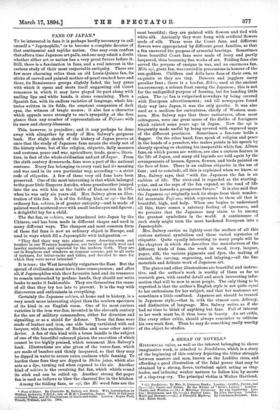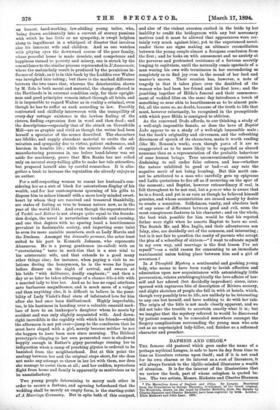A SHEAF OF NOVELS.*
HISTORICAL value, as well as the interest belonging to clever imaginative work, is attached to Bondslaves, which is a story of the beginning of this century depicting the bitter struggle between masters and men, known as the Luddite riots, and affording a good illustration of the fatal power that may be obtained by a strong, fierce, turbulent spirit acting as ring- leader, and inducing weaker natures to follow him by means of a clap-trap cry. The principal victim is Walter Hartland, • (L) Bond:dares. By Mrs. G. Linmeus Banks. London : Griffith, Ferran, and Co.—(2 ) Vashti and Esther. By the Writer of " Belle's Letters " London : Chatto and Windus.—(3.) A Marriage Ceremony. By Ada Cambridge. Lon- don : HatehMson and Co.—(4.) Baptist Lake. By John Davidson. London : Ward and Downey.—(5.) A Threefold Mystery. By Constance Serjeant. Lon- don : Elliot Stook. an honest, hard-working, law-abiding young tailor, who, being drawn accidentally into a current of stormy passions with which he has little or no sympathy, is swept helpless along to ingulfment in a whirlpool of disaster that involves also his innocent wife and children. And as one watches with pitying eyes the downward coarse of the poor family, whose peaceful home is made desolate, and competence and happiness turned to poverty and misery, one is struck by the resemblance to the similar process represented in L'Assommoir, where the melancholy result is produced by the pernicious in- fluence of drink, as it is in this book by the Luddite vow Walter was inveighed into taking; but there is the marked difference between the two cases that, whereas the deterioration shown by M. Zola is both moral and material, the change effected in the Hartlands is in external condition only, for their upright- ness and good principles remain intact through all trials, and it is impossible to regard Walter as in reality a criminal, even though he has to suffer as such according to law. Forcibly contrasted and skilfully interwoven with the tranquillity of every-day cottage existence is the lawless feeling of the rioters, finding expression first in word and then deed ; and the descriptions—especially that of the attack on Greenfolds Mill—are as graphic and vivid as though the writer had been herself a spectator of the scenes described. The characters are lifelike, and supply abundant material to excite the ad- miration and sympathy due to virtue, patient endurance, and heroism in humble life ; while the minute details of early manufacturing processes in use before hand-labour was set aside for machinery, prove that Mrs. Banks has not relied only on natural story-telling gifts to make her tale attractive, but prepared herself also by careful researches. It is alto- gether a book to increase the reputation she already enjoys as an author.
For a self-respecting woman to resent her husband's con- sidering her as a sort of block for ostentatious display of his wealth, and for her contemptuous spurning of his gifts to dispose him to solace himself with a more lowly minded sweet- heart by whom they are received and treasured thankfully, are states of feeling as true to human nature now, as in the year of the world 3544. And even though the superstructure of Vashti and Esther is not always quite equal to the founda- tion design, the novel is nevertheless readable and amusing, and one that depicts with no sparing hand a heartlessness prevalent in fashionable society, and imparting some taint to even its more amiable members, such as Lady Marcia and the Duchess. Amongst the dramatis persona, the actor least suited to his part is Kenneth Johnson, who represents Ahasuerus. He is a young gentlemen (so-called) with an " excruciating " taste in neck-ties that is a sore trial to his aristocratic wife, and that extends to a good many other things also; for instance, when paying a visit to re. lations during the honeymoon, he is the worse for liquor before dinner on the night of arrival, and swears at his bride "with deliberate, deadly emphasis ; " and then a day or so later he takes advantage of a chance tete-a-tete with a married lady to kiss her. And as he has no regal attribute save barbarous magnificence, and is much more of a vulgar cad than anything else, it is difficult to believe in the possi- bility of Lady Violet's final state of infatuated love for him after she had once been disillusioned. Highly improbable, too, is his hastiness in handing over a valuable emerald neck- lace of hers to an innkeeper's daughter whom he meets by accident and was only slightly acquainted with. And down- right incredible is the rapidity with which his friends—whilst the afternoon is not yet over—jump to the conclusion that he must have eloped with a girl, merely because neither he nor she happen to have been seen since morning. The Biblical prototype's clinging to her own persecuted race is shadowed happily enough in Esther's gipsy parentage rousing her to indignation when a camp of poaching gipsies is ordered to be banished from the neighbourhood. But at this point the analogy between her and the original stops short, for she does not make any attempt to throw in her lot with them, nor does she manage to assist them at all; and her sudden, mysterious flight from home and family is apparently so motiveless as to be unsatisfactory.
Two young people determining to marry each other in order to secure a fortune, and agreeing beforehand that the wedding shall be merely an empty form, is the starting-point of A Marriage Ceremony. But in spite both of this compact,
and also of the violent aversion excited in the bride by her inability to credit the bridegroom with any but mercenary motives (and it must be allowed that appearances were cer- tainly very much against him), yet to the experienced novel- reader there are signs making an ultimate reconciliation between the young couple almost a foregone conclusion from the first ; and he looks on with amusement and no anxiety at the perverse and protracted resistance of a fortress secretly longing to capitulate, until the naturally comic spectacle of a man wooing his own wife terminates in her surrendering so completely as to find joy even in the sound of her lord and master's snores. Their reunion has, however, a note of tragedy in that it takes place over the deathbed of the woman who had been her friend and his first love ; and the jumbling together of Hilda's funeral and their commence- ment of wedded bliss on the same day introduces a touch of something so near akin to heartlessness as to be almost pain- ful, all the more so, no doubt, because of the truth to life that must, however reluctantly, be recognised in the promptitude with which poor Hilda is consigned to oblivion.
As the renowned Dodo affords, to our thinking, a study of a well-nigh impossible female, so does the hero of Baptist Lake appear to us a study of a well-nigh impossible male ;
but the book's originality and cleverness, and the refreshing directness of speech of its characters, make it worth reading (like Mr. Benson's work), even though parts of it are so exaggerated as to be more likely to be regarded as absurd nonsense than as a representation of the probable behaviour of sane human beings. True unconventionality consists in disdaining to sail under false colours, and has—whether the nature exhibited be good or bad—at any rate the negative merit of not being humbug. But this merit can- not be attributed to a man who carefully gets up epigrams and Latin quotations to fire off as if occurring on the spur of the moment; and Baptist, however extraordinary if real, is
felt throughout to be not real, but a poseur who is aware that he is a fraud, and yet is as vain as though he believed himself
genuine, and whose eccentricities are caused mostly by desire to create a sensation. Selfishness, vanity, and absolute lack of any sense of difference between good and evil, seem the most conspicuous features in his character; and on the whole, the best wish possible for him would be that his reputed father were right when he asserts Baptist to have no soul.
The Scotch Mr. and Mrs. Inglis, and their adventurous son Islay, also, are decidedly out of the common, and interesting ; but is it not fair to question the sanity of parents who accept
the plea of a schoolboy of sixteen—" I want to educate myself in my own way, and marriage is the first lesson I've set myself "—as a valid reason for consenting to an immediate matrimonial union taking place between him and a girl of seventeen F In A Threefold Mystery a sentimental and gushing young lady, who seems to have been ready to lavish affection and
admiration upon new acquaintances with astonishingly little provocation, relates autobiographically the love-affairs of her- self and her adored (but decidedly imprudent) sister, inter-
spersed with rapturous bits of description of Riviera scenery, and slight sketches of people she fell in with at hotels, which, though very possibly true to life, are unlikely to be interesting
to any one but herself, and have nothing to do with her tale. The origin of the title is not made clearly apparent, and we did not take the trouble to ascertain exactly what it is ; but we imagine that the mystery referred to would be discovered by patient research to be concealed somewhere amongst the forgery complications surrounding the young man who sets out as an unprincipled lady-killer, and finishes as a reformed character and preacher.



































 Previous page
Previous page